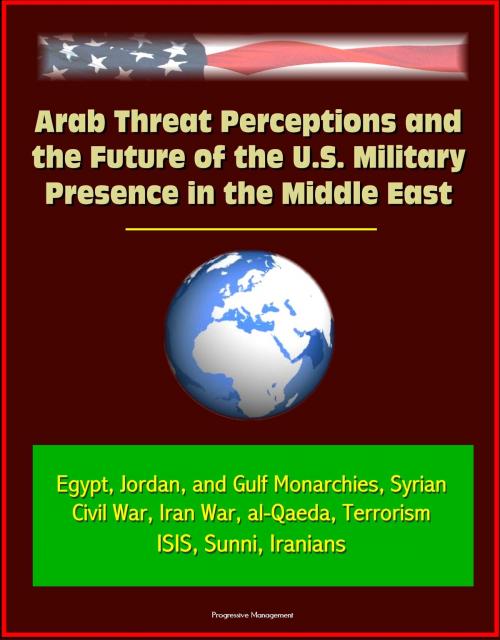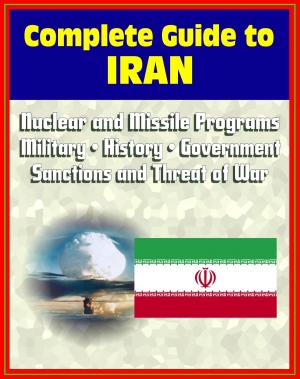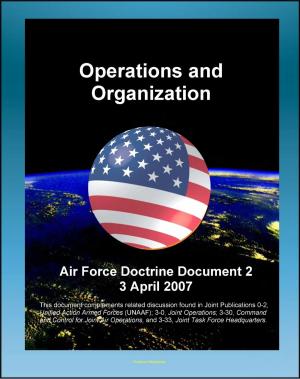Arab Threat Perceptions and the Future of the U.S. Military Presence in the Middle East: Egypt, Jordan, and Gulf Monarchies, Syrian Civil War, Iran War, al-Qaeda, Terrorism, ISIS, Sunni, Iranians
Nonfiction, History, Middle East, Military| Author: | Progressive Management | ISBN: | 9781311664907 |
| Publisher: | Progressive Management | Publication: | March 5, 2016 |
| Imprint: | Smashwords Edition | Language: | English |
| Author: | Progressive Management |
| ISBN: | 9781311664907 |
| Publisher: | Progressive Management |
| Publication: | March 5, 2016 |
| Imprint: | Smashwords Edition |
| Language: | English |
Professionally converted for accurate flowing-text e-book format reproduction, this study examines Arab threat perceptions and the future of the U.S. military presence in the Middle East. The Middle East is currently in one of its most dramatic periods of turbulence since the post-World War I emergence of the modern state system in that region. Recently, the United States and its Arab allies have been concerned by a number of distressing regional trends including the uncertain future of Iranian influence throughout the region, the rise and persistence of the Islamic State (IS) organization, the ouster of Yemen's Abd Rabbuh Mansur Hadi government from the capital of Sana'a and that country's subsequent civil war, and the rise of insurgencies in Libya, Egypt, and especially the Sinai.
The intense unrest in the Middle East has created new conflicts, but it has also brought some of the regional status quo powers into a greater level of cooperation to help address these problems. Saudi Arabia has emerged as a significant regional leader, almost by default, as other important Arab states such as Iraq, Syria, Egypt, and Libya have been struggling with domestic crises. Since the ouster of Egypt's Muslim Brotherhood government in July 2013, Riyadh and Cairo have maintained what often appears to be an important and stable working relationship. Saudi Arabia and other Gulf countries have provided billions in aid to the Abdel Fattah el-Sisi government in Egypt, and Riyadh and Cairo have discussed dramatically increased military cooperation. The Arab states aligned with the United States currently are facing a number of particularly serious regional policy problems and remains an incubator of radicalism and terrorism. The Syrian civil war currently presents few scenarios for a decent outcome and continues to consume massive numbers of lives.
Under these circumstances, the serious and mutating problems facing both the United States and the conservative Arab states are likely to cause both friction and cooperation between allies. The Saudis and other Gulf Arab oil producers also fear that new sources of global energy and more efficient usage of that energy have made them less important to the United States.
The Strategic Studies Institute is pleased to offer this monograph as a contribution to the national security debate on this important subject as our nation continues to grapple with a variety of problems associated with the future of the Middle East. This analysis should be especially useful to U.S. strategic leaders, policy analysts, and intelligence professionals as they seek to address the complicated interplay of factors related to regional security issues, fighting terrorism, and the support of local allies. This work may also benefit those seeking a greater understanding of long range issues of Middle Eastern and global security. It is hoped that this work will be of benefit to officers of all services as well as other U.S. Government officials involved in military and security assistance planning.
Professionally converted for accurate flowing-text e-book format reproduction, this study examines Arab threat perceptions and the future of the U.S. military presence in the Middle East. The Middle East is currently in one of its most dramatic periods of turbulence since the post-World War I emergence of the modern state system in that region. Recently, the United States and its Arab allies have been concerned by a number of distressing regional trends including the uncertain future of Iranian influence throughout the region, the rise and persistence of the Islamic State (IS) organization, the ouster of Yemen's Abd Rabbuh Mansur Hadi government from the capital of Sana'a and that country's subsequent civil war, and the rise of insurgencies in Libya, Egypt, and especially the Sinai.
The intense unrest in the Middle East has created new conflicts, but it has also brought some of the regional status quo powers into a greater level of cooperation to help address these problems. Saudi Arabia has emerged as a significant regional leader, almost by default, as other important Arab states such as Iraq, Syria, Egypt, and Libya have been struggling with domestic crises. Since the ouster of Egypt's Muslim Brotherhood government in July 2013, Riyadh and Cairo have maintained what often appears to be an important and stable working relationship. Saudi Arabia and other Gulf countries have provided billions in aid to the Abdel Fattah el-Sisi government in Egypt, and Riyadh and Cairo have discussed dramatically increased military cooperation. The Arab states aligned with the United States currently are facing a number of particularly serious regional policy problems and remains an incubator of radicalism and terrorism. The Syrian civil war currently presents few scenarios for a decent outcome and continues to consume massive numbers of lives.
Under these circumstances, the serious and mutating problems facing both the United States and the conservative Arab states are likely to cause both friction and cooperation between allies. The Saudis and other Gulf Arab oil producers also fear that new sources of global energy and more efficient usage of that energy have made them less important to the United States.
The Strategic Studies Institute is pleased to offer this monograph as a contribution to the national security debate on this important subject as our nation continues to grapple with a variety of problems associated with the future of the Middle East. This analysis should be especially useful to U.S. strategic leaders, policy analysts, and intelligence professionals as they seek to address the complicated interplay of factors related to regional security issues, fighting terrorism, and the support of local allies. This work may also benefit those seeking a greater understanding of long range issues of Middle Eastern and global security. It is hoped that this work will be of benefit to officers of all services as well as other U.S. Government officials involved in military and security assistance planning.















